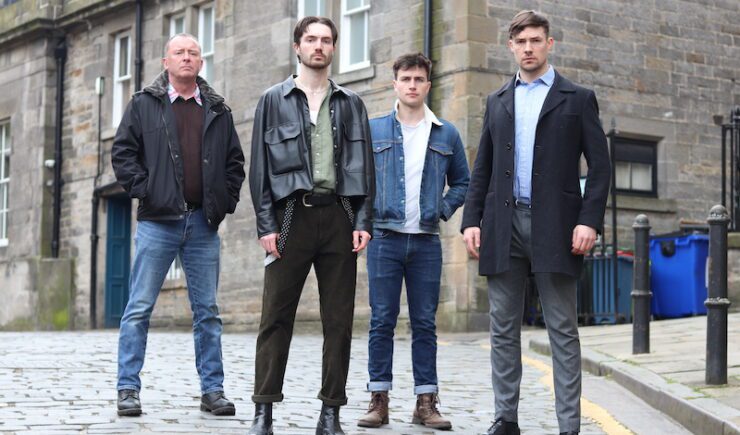A Men’s Shed in East Lothian is the setting for Shelley Middler’s The Collie’s Shed, landing at EdFringe tomorrow to tell the tale of four retired miners who suddenly discover that a review in the policing of the 1980s Miners’ Strikes is going to affect their friendships and personal lives forever. The show has become increasingly pertinent as the UK reflects on a new era of strike action and its’ connotations with what has come to pass.
We sat down with Fin Ross Russell from Island Life Productions to take a look at the show’s intriguing origins, how they’ve worked with the community to develop the piece, and what we can expect from this important piece of Working Class performance. Join us for a pixelated pint.
Catch The Collie’s Shed at Gilded Balloon Patter Hoose – Other Yin from tomorrow 2nd August until the 20th at 13:15. Tickets are available through the EdFringe Box Office.
Jake: Hey Fin! The Collie’s Shed takes a look at the policing of the Miners’ Strikes of the 1980s through the lens of a Men’s Shed in East Lothian – tell us a little about the piece’s origins and why you decided to tell this story.
Fin: Hi Jake! Lovely to speak to you! The Collie’s Shed was written by emerging Scottish writer Shelley Middler. Shelley grew up in an East Lothian community that was affected by the events of the Miners’ strikes. Many of the stories associated with that seminal moment in history can still be told and experienced at the local men’s shed where today working class men from the local community will come to engage in a range of activities in a safe and supportive environment.
Although this is a story told about a Scottish community by a Scottish cast at a Scottish festival, the Miners’ Strikes left their mark on similar towns across the country leaving a permanent mark on the social fabric of the United Kingdom. In telling this story at the Fringe, we’re not only looking forward to introducing the events and effects of the Miners’ Strikes to a new audience but also connecting with people’s lived experiences to gain further insight into the lessons we can learn about the present.
Jake: The piece explores and reflects on the very present Union culture in the United Kingdom through past and present – tell us what you’re hoping the audience takes away from the piece.
Fin: At the end of last year’s Edinburgh Fringe Festival, the binworkers’ strike stole all the headlines as piles of garbage piled up all around the city centre. In the midst of that, debates began to rage between those supporting the strikers and those against. This would set the tone for the rest of the year as strikes raged across almost all working sectors whilst the Conservative government at Westminster continued to work to cut down the power of unions.
The parallels between today’s time and that of the Miners’ Strikes nearly 40 years ago are downright eerie. As a result of Margaret Thatcher’s actions during that period, unions have significantly less power and therefore the working class have significantly less of a voice over decisions that affect their income, health and wellbeing. Although everybody’s entitled to their opinion and like most political issues, it’s inevitable that there won’t be unanimous agreement, our role as artists is to use the stories of people to both entertain and educate around the issues most affecting our society. It’s particularly important to us with this play to tell working class stories, highlighting the importance of those figures and stories in our creative landscape.
Jake: Island Life Productions, your company behind the piece, is a community interest group, bringing this story to a Fringe stage – tell us a little about the process of bringing the show to the Fringe.
Fin: As a company dedicated to working with emerging artists and members of the public to create high quality art, it’s always been extremely important to us that we pay everybody we work with. This has made theatre a difficult thing for us to commit to producing owing to the sheer number of people involved and the time required to put together a full-length play. Add in the logistical complexities and soaring costs of participating at the Edinburgh Fringe Festival and despite this festival being an exciting opportunity in our home city, it’s also been one we’ve felt reluctant to participate in.
That said, sometimes as a producer, you have to throw all sense and logic in the air and take a chance on a show and a team that you just can’t help but root for and believe in. For us, that was always Shelley Middler and ‘The Collie’s Shed’. When they brought the show to the Fringe last year, they did an incredible job putting on a fantastic show in a hotel conference room. From that point, I knew I wanted to help this show fulfil its amazing potential and that journey has led us back to the Fringe 12 months later working with the fantastic Gilded Balloon team to deliver not only a great show for our audience but invaluable professional development experience for our entire team.
Jake: Tell us about your relationship with Edinburgh and the Fringe – have you been before and how are you feeling about it all now we are so close?
Fin: There are many things we are still learning about ourselves following the COVID-19 pandemic. It was unthinkable that we’d ever have a year without the Edinburgh Fringe Festival and yet, that was precisely what happened in 2020 as all arts activity (including our company’s) moved online. Now that we are back to “normal”, there are many things about the Festival that people are becoming conscious of with particular note to the prohibitive costs of accommodation, entry fees and venue hires with no accountability regarding the terrible working conditions that performers and ushers and flyerers are regularly subjected to.
As the co-founder of an Edinburgh-based arts company, I love the concept of the Fringe. It gives me an opportunity to connect with colleagues from around the world in my city whilst enjoying exciting new stories and creative interpretations that Edinburgh residents don’t get access to during the rest of the year. I hope that through further dialogue over the 11 months outside of August, solutions can be found that protect all stakeholders of this event we love so much, especially for the residents of Edinburgh who generously welcome visitors from all across the globe to this fantastic city every year.
Jake: Given the themes of Binge Fringe, if your show was a beverage of any kind (alcoholic, non-alcoholic – be as creative as you like!), what would it be and why?
Fin: As somebody who doesn’t drink, my selection of choices for this question isn’t as wide-ranging as I’d like it to be! I think however if ‘The Collie’s Shed’ were a drink, it would be an Irn Bru, hearty, unabashedly Scottish and a true flavour of what makes our part of the world special. Much like our show’s political themes, the orange colour can initially seem slightly intimidating but once you begin sipping, you’ll appreciate how well everything fits together and then you’ll be able to sit back and enjoy it!
Tickets are available through the EdFringe Box Office.
Hear the latest from Marginalised Voices from Fringes across the World
Subscribe to our Email Newsletter so we can send you insightful updates about unheard creative voices working to platform powerful stories. You'll be the first to hear about our content and how to apply to have shows you're working on reviewed.
Powered by EmailOctopus









